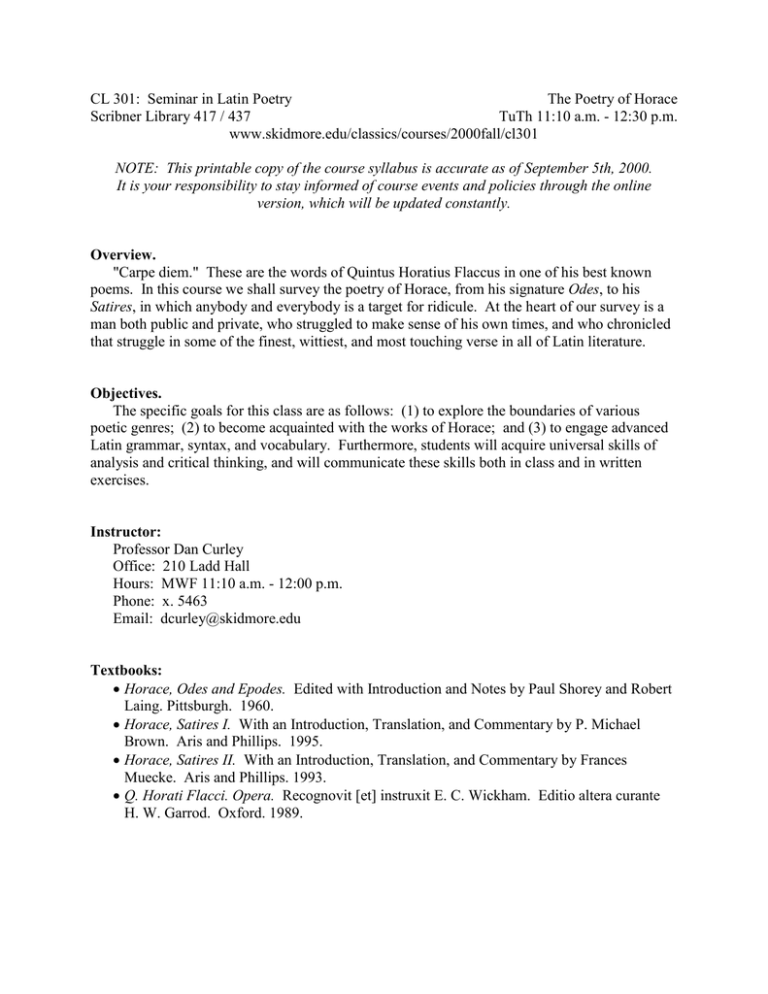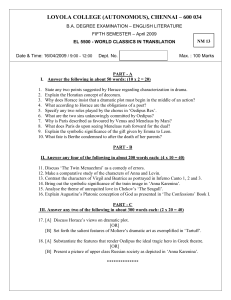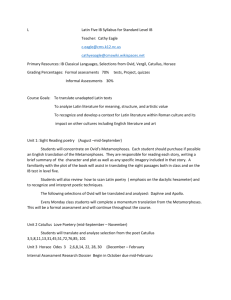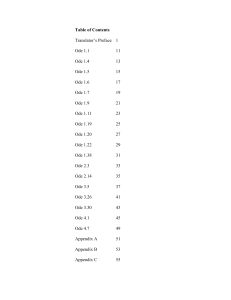CL 301: Seminar in Latin Poetry The Poetry of Horace
advertisement

CL 301: Seminar in Latin Poetry The Poetry of Horace Scribner Library 417 / 437 TuTh 11:10 a.m. - 12:30 p.m. www.skidmore.edu/classics/courses/2000fall/cl301 NOTE: This printable copy of the course syllabus is accurate as of September 5th, 2000. It is your responsibility to stay informed of course events and policies through the online version, which will be updated constantly. Overview. "Carpe diem." These are the words of Quintus Horatius Flaccus in one of his best known poems. In this course we shall survey the poetry of Horace, from his signature Odes, to his Satires, in which anybody and everybody is a target for ridicule. At the heart of our survey is a man both public and private, who struggled to make sense of his own times, and who chronicled that struggle in some of the finest, wittiest, and most touching verse in all of Latin literature. Objectives. The specific goals for this class are as follows: (1) to explore the boundaries of various poetic genres; (2) to become acquainted with the works of Horace; and (3) to engage advanced Latin grammar, syntax, and vocabulary. Furthermore, students will acquire universal skills of analysis and critical thinking, and will communicate these skills both in class and in written exercises. Instructor: Professor Dan Curley Office: 210 Ladd Hall Hours: MWF 11:10 a.m. - 12:00 p.m. Phone: x. 5463 Email: dcurley@skidmore.edu Textbooks: Horace, Odes and Epodes. Edited with Introduction and Notes by Paul Shorey and Robert Laing. Pittsburgh. 1960. Horace, Satires I. With an Introduction, Translation, and Commentary by P. Michael Brown. Aris and Phillips. 1995. Horace, Satires II. With an Introduction, Translation, and Commentary by Frances Muecke. Aris and Phillips. 1993. Q. Horati Flacci. Opera. Recognovit [et] instruxit E. C. Wickham. Editio altera curante H. W. Garrod. Oxford. 1989. CL 301: The Poetry of Horace 2 Course requirements: Class participation (20%). Class participation involves more than just attendance. You must also keep up with the readings and assignments, and participate actively during our sessions. Furthermore, I expect that you will come to class on time and that you will maintain an environment that promotes the exchange of ideas. Commentary assignment (10%). This term you will not only make extensive use of scholarly commentaries when reading Horace, but you will also have the opportunity to write a commentary with your peers on one of Horace's odes. Article report (10%). Each student will present a 15-minute report on a scholarly article or book chapter. You will select a work from our bibliography or another source, and circulate focus questions at least one class meeting prior to your presentation. Examinations (30%). There will be two examinations, a midterm and a final. The midterm will be held in class on Tuesday, October 31st. The final is scheduled for Tuesday, December 19th. Each exam is worth 15% of your final grade. Research project (30%). The research project has several components, including a topic statement, an annotated bibliography (four versions), an outline, two formal presentations of your topic, and the research paper itself (approx. 20 pages in length). Be sure to consult the online Timetable to see when the assignments, quizzes, exams, and other events have been scheduled. Strategies for success. While every student must approach Latin in his or her own way, it will prove worthwhile to approach the requirements of this seminar in an organized and systematic manner. Below are some strategies to consider for success in CL 301. Keep up with the workload. As simplistic as it sounds, this is perhaps the most useful strategy, as well as the most difficult to follow. Our pace, on average, will be about 50 verses of Horatian Latin every class. This means that you should work with the text every day. Don't save it all for the night before. You should likewise strive to keep up with the various assignments and components of the research project. Review regularly. Again, this seems obvious, but regular review of past readings and exercises, as well as essential grammar and vocabulary, will save you much trouble later on. I recommend flash cards or some other mnemonic aid for vocabulary words. Read, don't translate. That is, rather than memorizing an English translation of every sentence or passage, focus on putting all of the pieces together in Latin. T he result will be a closer focus on the Latin — which is, after all, a primary objective of the course. CL 301: The Poetry of Horace 3 Strategies for success (continued): Remember the genres. Not only was Horace a poet, but he was a poet of many facets: a singer of odes, a satirist, as well as an author of poetic epistles. Each genre differs from the other in terms of sound and sense, as much as poetry differs from prose. Bear these differences in mind as you proceed. I hope that you will find CL 301 to be a challenging yet rewarding experience. F O R T V N A O M N I B V S B O N A


